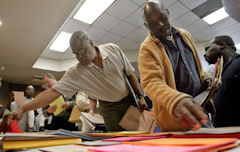 Even before the recession, many Midwestern African-American communities were in distress, writes Algernon Austin with the Economic Policy Institute in “High Black Unemployment Widespread across Nation’s Metropolitan Areas.” Black unemployment was especially high in rust belt cities like Detroit, Cleveland and Milwaukee. By contrast, he notes, blacks fared relatively well in Sun Belt metro areas such as Tampa, Miami and Las Vegas.
Even before the recession, many Midwestern African-American communities were in distress, writes Algernon Austin with the Economic Policy Institute in “High Black Unemployment Widespread across Nation’s Metropolitan Areas.” Black unemployment was especially high in rust belt cities like Detroit, Cleveland and Milwaukee. By contrast, he notes, blacks fared relatively well in Sun Belt metro areas such as Tampa, Miami and Las Vegas.
And in which of the 31 metro areas surveyed did blacks do the very best of all? Let’s see. The Washington metro area ranked 29th in black unemployment in 2007, with a rate of 4.8%. Richmond ranked 30th, with 4.7% black unemployment. And Hampton Roads ranked 31st, or the lowest of all, with 4.1% black unemployment. Virginia metros grabbed the three lowest slots! Say what you will about Virginia’s Scrooge-like social safety net and allegedly retrograde social attitudes, but when times were good, blacks enjoyed greater employment opportunities than in the supposedly progressive states of the Midwest and Northeast.
What happened when the recession hit and unemployment soared? African-Americans were harder hit than other Americans; arguably, they were the most vulnerable because they were the least equipped with skills and education. Even so, they still were better off in Virginia than they were elsewhere in the country.
Of the 31 metro areas surveyed, Richmond ranked 28th in black unemployment, with a rate of 10.6%. Then came Washington in the 29th spot with 9.6% black unemployment. New Orleans snuck into the 30th spot. But Hampton Roads still stood out as the metro area with the lowest rate of black unemployment: 8.5%.
To some degree, low black unemployment rates in Virginia metros reflect the fact that unemployment generally is and has been lower in Virginia than elsewhere in the country. Delving a little deeper, Austin compiled one other measure of interest: the black-to-white unemployment ratio. By that measure, Virginia doesn’t score as well.
With a black-to-white unemployment ratio of 2.0 — meaning that blacks were two times more likely to be unemployed than whites — the Washington metro region ranked 13th in the country in 2010 (tied with four other regions). Richmond ranked 20th with a ratio of 1.8. But Hampton Roads was still looking good, tied with Kansas City and New Orleans with a ratio of 1.3 for the lowest black-to-white unemployment ratio in the country.
All things considered — overall economic health and a low black-to-white employment ratio — Hampton Roads would seem to be a beacon of employment opportunity for African Americans. Basket cases like Detroit and Milwaukee garner a lot of attention for African American economic hardship. Maybe someone should look at Hampton Roads as a case study in African American opportunity.
— JAB


